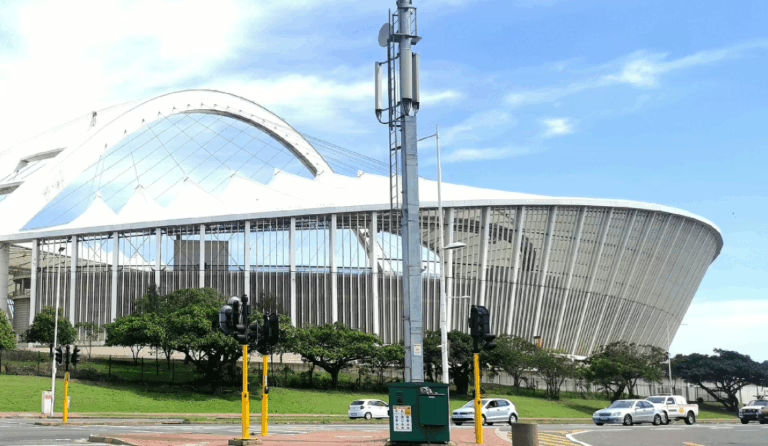South Africa stands a chance to secure qualification for the 2026 FIFA World Cup by defeating Zimbabwe, potentially at Nigeria’s expense…
The Zimbabwe Football Association (ZIFA) has officially announced that their forthcoming 2026 FIFA World Cup qualifying match against South Africa will take place at Moses Mabhida Stadium in Durban, South Africa, according to Soccernet.ng.
Recently, Nigerian media outlets have expressed strong dissatisfaction with CAF’s ruling that permits Lesotho and Zimbabwe to host their home fixtures on South African soil.
In the previous qualifying round, Lesotho’s home match against South Africa was held in South Africa, where Bafana Bafana secured a decisive 3-0 victory.
The core of the Nigerian media’s grievance is that South Africa gains an undue edge by effectively hosting multiple “home” games within its borders.
Looking ahead, Lesotho is scheduled to host two matches, including one against Nigeria, while Zimbabwe will host South Africa once and play away against Lesotho.
However, Zimbabwe has now confirmed that their “home” fixture against South Africa will also be staged in South Africa.
Initially, ZIFA intended to hold the match in Francistown, Botswana, but logistical complications forced a change of venue to South Africa.
“The Zimbabwe Football Association (ZIFA) wishes to inform supporters that the upcoming FIFA World Cup qualifier against South Africa on October 10 will be held at Moses Mabhida Stadium in Durban, South Africa,” the association stated.
“Our original plan was to host the match in Francistown, Botswana, but the stadium became unavailable due to Botswana’s own scheduling needs.
“After evaluating options in the region, only two suitable venues in South Africa remained: Orlando Stadium and Moses Mabhida Stadium.
“Considering factors such as logistics, expenses, facilities, and fan safety, ZIFA selected Moses Mabhida Stadium to provide the Warriors with the most favorable conditions to compete.”
Implications of Zimbabwe’s Venue Choice for Nigeria
While Zimbabwe’s decision to play their home qualifier in South Africa does not directly impact Nigeria, it undeniably grants South Africa a significant competitive advantage over other group members.

In African football, the home ground advantage is crucial due to the challenges posed by extensive travel across the continent. Playing in South Africa means Bafana Bafana will enjoy the backing of their local supporters, which can be a decisive factor.
Moreover, some teams have been known to employ questionable tactics to unsettle their opponents. For instance, during Nigeria’s recent encounter with South Africa, the South African Football Association selected a suboptimal stadium, which some viewed as a strategic move to disrupt the Super Eagles.
Currently, Group C standings in the World Cup qualifiers show South Africa leading with 17 points, followed by Benin trailing by three points.
Nigeria and Benin are tied for third and fourth place with 11 points each, Lesotho holds fifth with six points, and Zimbabwe remains at the bottom with four points after eight matches.
At this stage, Nigeria’s chances of reaching the FIFA World Cup appear slim, as the Super Eagles have struggled significantly throughout the qualification campaign.

Ultimately, although South Africa benefits from hosting multiple fixtures, the Super Eagles must acknowledge that their inconsistent performances have largely contributed to their precarious position in the qualifiers.


















0 Comments